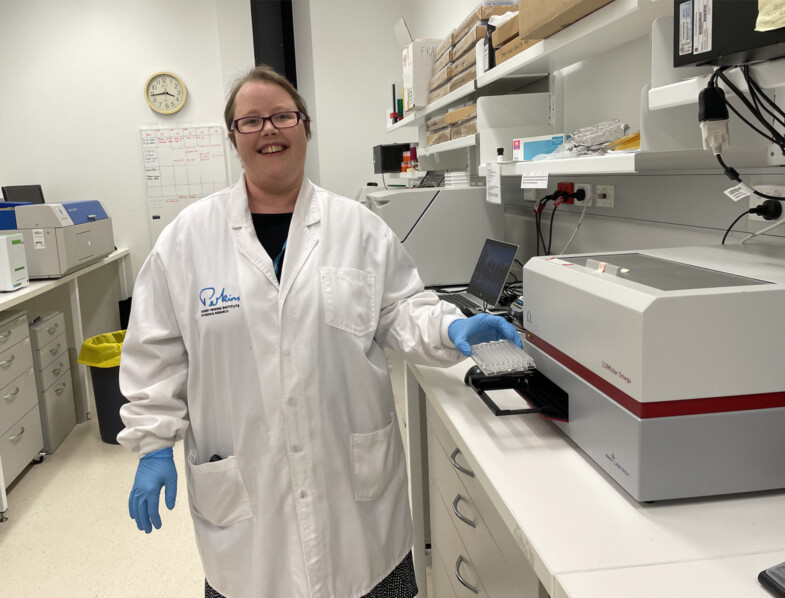Dr Emily Golden shares how her team’s discovery could improve treatment outcomes for individuals with ovarian cancer and bring hope for a cancer free future. For Ovarian Cancer Awareness month, we sat down with her to learn more about the research.
Targeting a specific protein could kill cancer cells
Ovarian cancer is one of the most devastating cancers. It often has the worst prognoses, with minimal treatment options available.
A new aggressive subtype of ovarian cancer is found in ten percent of patients. These patients have the worst rates of survival, with their tumours being resistant to one of the only treatments for ovarian cancer, the drug Cisplatin.
Professor Pilar Blancafort previously identified a protein called AAMDC which had a role in the development of breast cancer. Dr Golden, and the Blancafort lab team, have been investigating the role of AAMDC in ovarian cancer. They have found that extra copies of this protein are found in those ten per cent of ovarian cancer patients. She says that targeting this protein could be the key to more effective treatment.
“We’ve found that blocking AAMDC can kill the cancer cells”, Dr Golden says.
Our preliminary research shows if you block AAMDC, you’re not just helping to kill the cancer cells, you’re also making those tumour cells more sensitive to the Cisplatin treatment.
While the research is still in its early stages, there’s a lot of hope for what this could mean for individuals with ovarian cancer.
“Although the development of a new treatment would be some time away, we may see the outcomes of the research sooner if we can identify suitable patients and treat them appropriately with the drugs we already have.” Dr Golden shares.
Addressing the gap in awareness and treatment of ovarian cancer
Ovarian cancer has not had the same focus as other cancers, and researchers working in ovarian cancer have not had the same success in identifying subtypes or the biomarkers that define these subtypes. Dr Golden believes that further research, greater awareness across all sectors, and better treatments are needed for ovarian cancer. Her research is addressing this much needed gap.
“There’s more awareness about other cancers such as breast cancer – the general population are aware of the different types of breast cancer, there’s different treatments available, and survival rates are improving. Ovarian cancer just doesn’t have that same awareness,” she says.
Hope for a cancer free future
One of the reasons Dr Golden became a cancer researcher is because her own mother passed away from breast cancer at age 42.
“My mum was really hopeful about the future of treatments. With my research, I want to bring that hope to other people,” Dr Golden says.
However, she emphasises, that the only way we can do this research is with funding.
“There are so many good researchers that could be doing more research, and getting results and new treatments – we just need the funding,” she says.
She adds, “I do see hope in the future – I just think it’s a matter of research. If we do enough research, we will be able to eliminate cancer.”
For more information
- Learn the signs and symptoms of ovarian cancer
- Find out how you can support local cancer research
